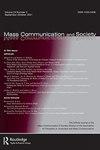通过准社会关系解释与传播者的熟悉程度对流行病相关的恐惧呼吁的说服效果的影响
IF 2.7
2区 文学
Q1 COMMUNICATION
引用次数: 0
摘要
准社会关系可以提高广告等说服性信息的有效性。然而,人们对副社会关系在处理恐惧诉求中的作用知之甚少——尽管这种沟通策略很受欢迎,但它经常引起人们不想要的反应,比如抗拒。感知自我效能感是决定恐惧诉求是改善态度/行为还是产生不必要的自食其果的一个关键变量。在两级被试实验(N = 91)中,我们发现,与不熟悉的传播者相比,来自熟悉的传播者的与covid -19相关的恐惧呼吁促进了抗冠状病毒措施,唤起了更多的感知自我效能感,这可以通过媒体用户与熟悉的传播者的副社会关系来解释。第二项双水平受试者间实验(N = 239)重复了这些发现,并表明感知自我效能抑制了抗拒反应(信息贬损和感知到的对自由的威胁),并培养了对抗冠状病毒措施的积极态度和行为意图。【来自作者】《大众传播与社会》的版权是Taylor & Francis Ltd的财产,未经版权所有者的明确书面许可,其内容不得复制或通过电子邮件发送到多个网站或发布到listserv。但是,用户可以打印、下载或通过电子邮件发送文章供个人使用。这可以删节。对副本的准确性不作任何保证。用户应参阅原始出版版本的材料的完整。(版权适用于所有人。)本文章由计算机程序翻译,如有差异,请以英文原文为准。
The Impact of Familiarity with a Communicator on the Persuasive Effectiveness of Pandemic-Related Fear Appeals Explained Through Parasocial Relationships
Parasocial relationships can improve the effectiveness of persuasive messages such as advertising. However, little is known about the role of parasocial relationships in the processing of fear appeals—a communication strategy that, despite its popularity, often evokes unwanted responses such as reactance. Perceived self-efficacy is one key variable that determines whether a fear appeal improves attitudes/behavior or has unwanted boomerang effects. In a two-level between-subjects experiment (N = 91), we show that a COVID-19-related fear appeal promoting anti-coronavirus measures from a familiar communicator (compared to an unfamiliar communicator) evokes more perceived self-efficacy explained by media users' parasocial relationship with the familiar communicator. A second two-level between-subjects experiment (N = 239) replicates these findings and shows that perceived self-efficacy inhibits reactance responses (message derogation and perceived threat to freedom) and fosters positive attitudes and behavioral intentions toward anti-coronavirus measures. [ FROM AUTHOR] Copyright of Mass Communication & Society is the property of Taylor & Francis Ltd and its content may not be copied or emailed to multiple sites or posted to a listserv without the copyright holder's express written permission. However, users may print, download, or email articles for individual use. This may be abridged. No warranty is given about the accuracy of the copy. Users should refer to the original published version of the material for the full . (Copyright applies to all s.)
求助全文
通过发布文献求助,成功后即可免费获取论文全文。
去求助
来源期刊

Mass Communication and Society
COMMUNICATION-
CiteScore
6.90
自引率
3.30%
发文量
58
期刊介绍:
Mass Communication and Society" mission is to publish articles from a wide variety of perspectives and approaches that advance mass communication theory, especially at the societal or macrosocial level. It draws heavily from many other disciplines, including sociology, psychology, anthropology, philosophy, law, and history. Methodologically, journal articles employ qualitative and quantitative methods, survey research, ethnography, laboratory experiments, historical methods, and legal analysis.
 求助内容:
求助内容: 应助结果提醒方式:
应助结果提醒方式:


